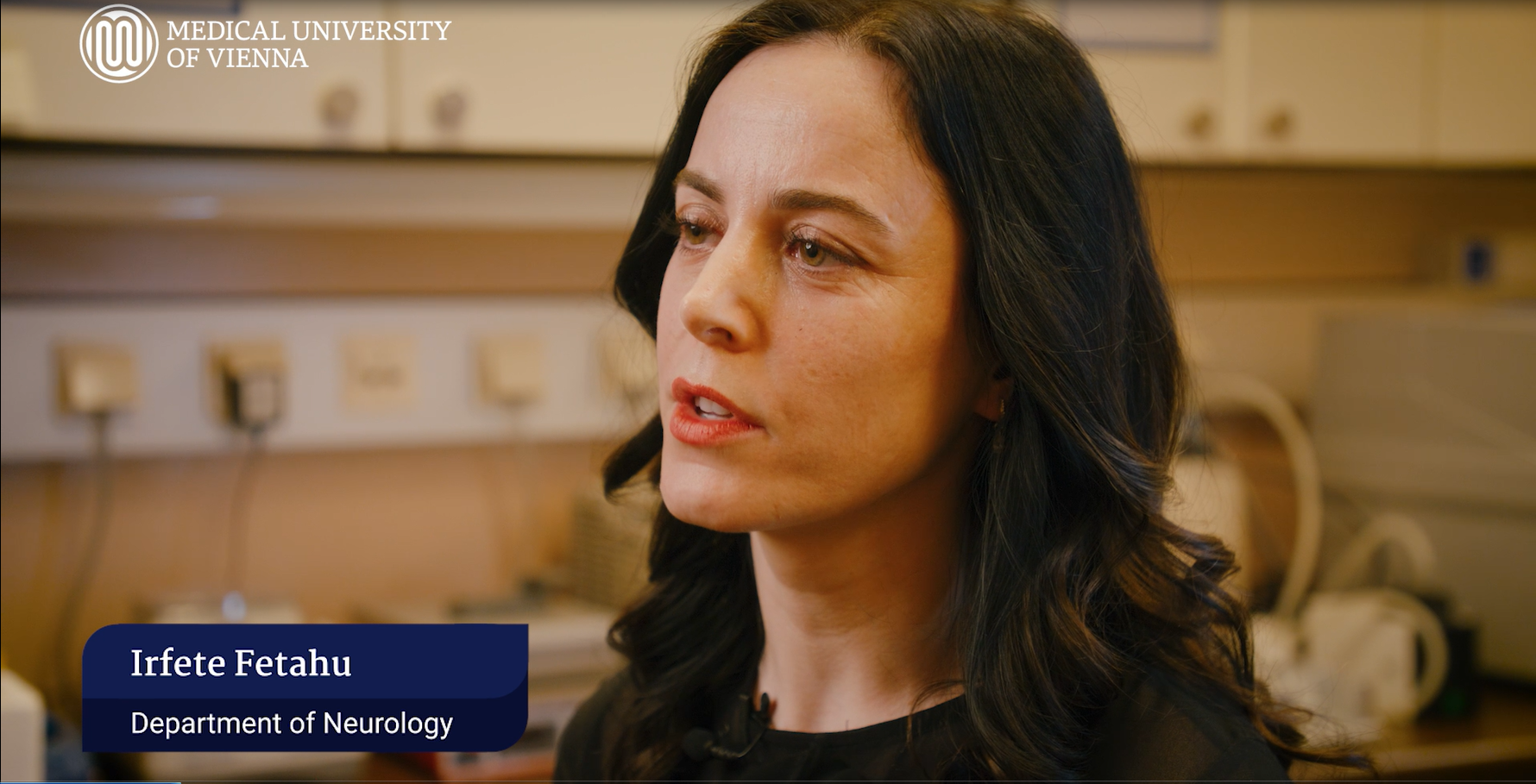
After activation, data will be sent to YouTube. Further information here: Data protection
English subtitles on Youtube available: click on the gear icon and select “Untertitel” – “English”
Dr. Irfete Fetahu

MedUni Wien RESEARCHER OF THE MONTH February 2024
Neuroblastoma (NB) is a childhood cancer, where >90% of metastatic stage NB tumors disseminate to the bone marrow (BM), which acts as a site for disease relapse and progression. Here, we employed single-cell transcriptomic and epigenomic profiling of BM aspirates across all NB subgroups, disentangling determinants of intra- and inter-tumoral heterogeneity, and demonstrate that NB subgroups determine cell type composition, and that tumor phenotype is conserved upon metastasis. Moreover, NB cells signal to the BM microenvironment, rewiring specifically the monocytes, through two specific pathways: Midkine and Macrophage Migration Inhibitory Factor. This communication between the tumor and myeloid cells promotes an inflammatory environment, characterized by activation of pro- and anti-inflammatory programs, and expression of tumor-promoting factors, reminiscent of tumor-associated macrophages. Importantly, the ligand/receptor pairs identified in our study play pleiotropic roles in normal and disease settings and offer novel molecular targets for a therapeutic opportunity by disrupting tumor-to-microenvironment communication or monocyte polarization in the BM metastatic niche.
Selected Literature
-
Fetahu, I.S., et al., Single-cell transcriptomics and epigenomics unravel the role of monocytes in neuroblastoma bone marrow metastasis. Nat Commun, 2023. 14(1): p. 3620.
-
Cohn, S.L., et al., The International Neuroblastoma Risk Group (INRG) classification system: an INRG Task Force report. J Clin Oncol, 2009. 27(2): p. 289-97.
-
Matthay, K.K., et al., Neuroblastoma. Nat Rev Dis Primers, 2016. 2: p. 16078.
-
Rifatbegovic, F., et al., Neuroblastoma cells undergo transcriptomic alterations upon dissemination into the bone marrow and subsequent tumor progression. Int J Cancer, 2018. 142(2): p. 297-307.
-
Abbasi, M.R., et al., Impact of Disseminated Neuroblastoma Cells on the Identification of the Relapse-Seeding Clone. Clin Cancer Res, 2017. 23(15): p. 4224-4232.
-
Soldatov, R., et al., Spatiotemporal structure of cell fate decisions in murine neural crest. Science, 2019. 364(6444).
-
Furlan, A., et al., Multipotent peripheral glial cells generate neuroendocrine cells of the adrenal medulla. Science, 2017. 357(6346).
-
Kildisiute, G., et al., Tumor to normal single-cell mRNA comparisons reveal a pan-neuroblastoma cancer cell. Sci Adv, 2021. 7(6).
-
Dong, R., et al., Single-Cell Characterization of Malignant Phenotypes and Developmental Trajectories of Adrenal Neuroblastoma. Cancer Cell, 2020. 38(5): p. 716-733.e6.
-
Jansky, S., et al., Single-cell transcriptomic analyses provide insights into the developmental origins of neuroblastoma. Nat Genet, 2021. 53(5): p. 683-693.
-
Kameneva, P., et al., Single-cell transcriptomics of human embryos identifies multiple sympathoblast lineages with potential implications for neuroblastoma origin. Nat Genet, 2021. 53(5): p. 694-706.
-
Bedoya-Reina, O.C., et al., Single-nuclei transcriptomes from human adrenal gland reveal distinct cellular identities of low and high-risk neuroblastoma tumors. Nat Commun, 2021. 12(1): p. 5309.
-
Johnsen, J.I., C. Dyberg, and M. Wickström, Neuroblastoma-A Neural Crest Derived Embryonal Malignancy. Front Mol Neurosci, 2019. 12: p. 9.
-
Cerezo-Wallis, D., et al., Midkine rewires the melanoma microenvironment toward a tolerogenic and immune-resistant state. Nat Med, 2020. 26(12): p. 1865-1877.
-
Le, Q.H., et al., Preclinical studies targeting CD74 with STRO-001 antibody-drug conjugate in acute leukemia. Blood Adv, 2023.
-
Fetahu, I.S., et al., Calcium-sensing receptor silencing in colorectal cancer is associated with promoter hypermethylation and loss of acetylation on histone 3. Int J Cancer, 2014. 135(9): p. 2014-23.
-
Wu, D., et al., Glucose-regulated phosphorylation of TET2 by AMPK reveals a pathway linking diabetes to cancer. Nature, 2018. 559(7715): p. 637-641.
-
Fetahu, I.S., et al., Epigenetic signatures of methylated DNA cytosine in Alzheimer's disease. Sci Adv, 2019. 5(8): p. eaaw2880.